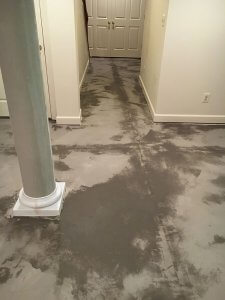Coming home to a flooded basement is no fun (believe me, we know). Homeowners can mitigate the damage, cost, and stress by choosing flooring that is not only durable and low-maintenance, but water-resistant and easy to replace.
 Putting the wrong flooring in your basement can have repercussions for your health. Mold and mildew love damp spaces and thrive on natural materials. If moisture gets trapped in your flooring, it can cause rot and decay and the more time you spend in your basement the higher the chance it may damage your health.
Putting the wrong flooring in your basement can have repercussions for your health. Mold and mildew love damp spaces and thrive on natural materials. If moisture gets trapped in your flooring, it can cause rot and decay and the more time you spend in your basement the higher the chance it may damage your health.
There is no perfect solution to the water damage caused by flooding, but there are many flooring options that may fit your needs. The most common types of flooring that are generally recommended for use in wet or flood-prone areas are ceramic tile, vinyl, treated concrete, or rubber.
Concrete
Concrete itself may be porous, absorbing water during a flood, but it can be treated with epoxy or a waterproof sealant that make it a cheap and effective solution for the basement. While colored stains may be applied under the sealant, concrete will still never have the aesthetic appeal of a more traditionally finished floor.
Rubber
Rubber flooring is available in a wide variety of colors, designs, and thicknesses. It can be installed as interlocking tiles, straight cut tiles, or rolls. Its inexpensive cost is one of rubber flooring’s major advantages and it can also be temporarily removed in the event of a flood in order to allow the floor underneath to dry faster. Unfortunately, rubber is not a good natural insulator and the floor of your basement will be cold unless you also install radiant heating beneath the rubber.
Ceramic Tile
 Tile is very durable and is impervious to water, making it extremely resistant to mold and mildew. It is also easy to maintain and is available in almost every color and pattern imaginable. Tile provides a clean, finished, and attractive solution that will add to the value of your home while minimizing the damage caused by a flooded basement. Like rubber, tile is a poor insulator and you might want to consider installing radiant heating. There is also a chance that the tile may crack if installed on a concrete subfloor that is settling. Cracked tiles can be replaced, but the repair should be done professionally.
Tile is very durable and is impervious to water, making it extremely resistant to mold and mildew. It is also easy to maintain and is available in almost every color and pattern imaginable. Tile provides a clean, finished, and attractive solution that will add to the value of your home while minimizing the damage caused by a flooded basement. Like rubber, tile is a poor insulator and you might want to consider installing radiant heating. There is also a chance that the tile may crack if installed on a concrete subfloor that is settling. Cracked tiles can be replaced, but the repair should be done professionally.
Vinyl
Vinyl flooring has several advantages in that it is inexpensive, easy to clean, resistant to mold and mildew, and rolled vinyl has very few seams for water to try and seep down to the subflooring. Additionally, vinyl can be made to look like nearly any type of hardwood, tile, or other substance that you want. Higher end, luxury vinyl plank can also be reused after a basement floods if you replace the underlayment, which is far less expensive. Floorte by Shaw Floors is a great example of the kind of flooring that is suited for basements. It is strong, flexible, and waterproof, resistant to both extreme heat and cold, and has a great aesthetic.
If you have a basement that is prone to flooding, give Unique Carpet and Floor a call at (703) 369-1600. We’d love to sit down with you during our free consultation and walk you through which option might be the perfect solution for your basement.

